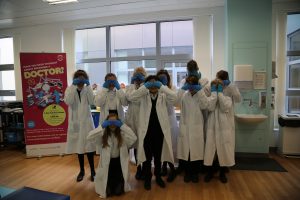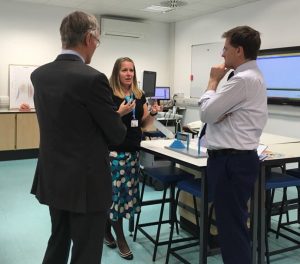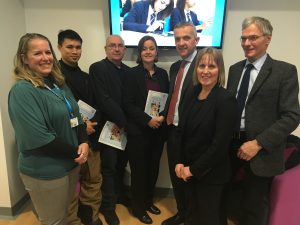It was a week where tackling childhood obesity was right back at the top of the political agenda – and LifeLab was right there supporting it.
TV chefs Jamie Oliver and Hugh Fearnley-Whittingstall were before the Health and Social Care committee giving a no-holds barred take on how important it was to develop a meaningful second phase of the childhood obesity strategy.
It was part of an inquiry that that, along with oral evidence, will also consider written reports that backed the need for a more joined-up and holistic approach to tackling the issue.
Responding to the call for evidence to be submitted was the Early LifeLab team, including Prof Mark Hanson, Dr Hannah Davey and Dr Kathryn Woods-Townsend who delivered a paper which outlined how the aims of our projects were entirely aligned to the strategy and that by putting children at the heart of that process, better lifestyle choices could be made.
Our recommendations included:
- Open up the conversation directly with schools, children, young people, families and communities.
- Widen the remit for use of funds from the Soft Drinks Levy, from simply the sports premium to be more inclusive one like the health premium, allowing schools to be more creative in deploying it.
- Department for Education to charge the Education Endowment Foundation (EEF) with providing meaningful frameworks for schools and teachers to work with, monitoring uptake by schools.
- Engage children and young people with the science behind health messages, empowering them to ask and answer questions and seek solutions for themselves.
Dr Hannah Davey said: “We felt it was important to contribute to this inquiry as tackling an issue like childhood obesity, as was underlined in the session this week, is not something that can be achieved by a single point of intervention.
“Our work at LifeLab pulls together schools, families and the young people themselves from the age of four, with the offer of Early LifeLab, through to 18 in a way that bridges the gap between what we are being told to do in order to become healthier and actually doing it.
“A key part of this is using the sports premium, or what we would like to see it called ‘the health premium’, is to give schools a way of funding initiatives that don’t burden them with something extra to do, but work within the existing curriculum and enhancing it.”
The session this week heard childhood obesity described as a “national security issue” by Jamie Oliver as he gave an impassioned plea to ministers to make the next part of the strategy meaningful.

LifeLab has also been backing his campaign #AdEnough this week, with visiting students from Bohunt school adopting the pose of covering their eyes to symbolise an end to the promotion of junk food advertising as part of Jamie’s food revolution.
He was joined at the Health and Social Care Committee by Hugh Fearnley-Whittingstall who said health inequalities were a major reason for obesity rates rising in recent years, with the most vulnerable being targeted by the promotion of unhealthy foods. He said: “Health inequality is at the centre of our difficulties and as a result we have to pull a lot of levers.
“I don’t think human nature has changed in the last 30 years but obesity rates have tripled.
“We have seen an arms race between the big brands, they are racing for our appetites and we are ultimately the losers.”
Both Jamie and Hugh reiterated the need for all parts of the government to come together to really tackle the issue – a point we also made in the conclusion of our paper.
“We should give children the opportunities to find out information for themselves, believing that they will discover the solutions best for their own lives, and empowering them to lead the change towards healthier lives.
“A coherent and consistent approach from all parts of government is necessary to support this.”

